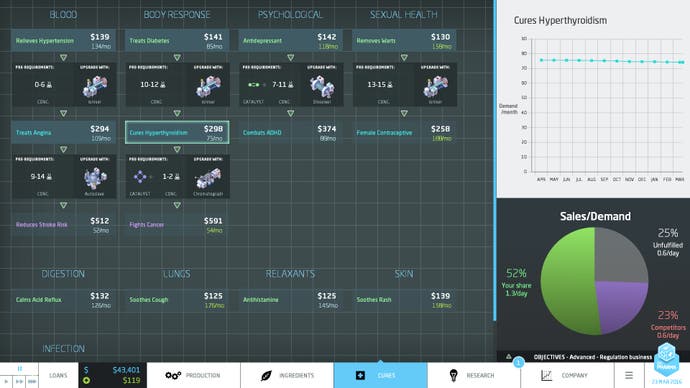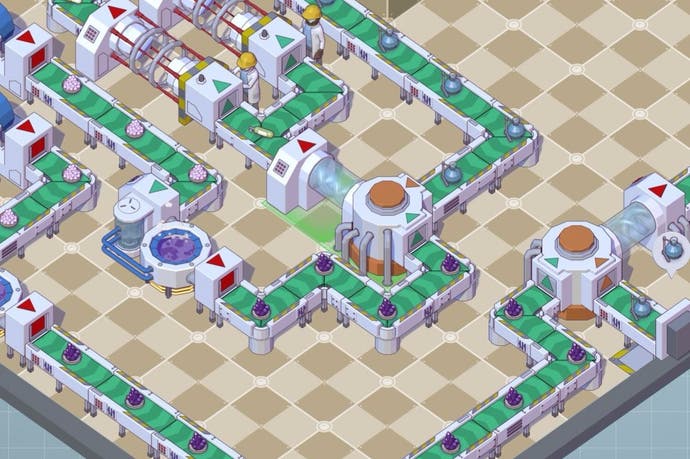Even with the Marketing and Malpractice DLC, Big Pharma just isn't evil enough
Trial and error.
Medicine is broken. "Drugs are tested by people who manufacture them, in poorly designed studies, on hopelessly small numbers of weird, unrepresentative patients, and analysed using techniques which are flawed by design, in such a way that they exaggerate the benefits of treatments. Unsurprisingly, these trials tend to produce results that favour the manufacturer," says Ben Goldacre in his book Bad Pharma. He also says quite a bit more beside, because medicine really is very broken. This is 1) terrible, because all of us rely on medicine at one time or another and have a basic faith in the white-coated ministers who provide it, and 2) a marvellous opportunity to make an extremely evil strategy game.
I want to recruit male students as research subjects, inject them with untried ingredients until their kidneys expire, and hide the results. I want to cynically patent my most-needed medicines and inflate the price to a monumental premium. I want to cancel all research projects on non-remunerative ailments and watch my little profit ticker tick cheerfully into the black. I want to run aggressive advertising campaigns telling people that their perfectly normal sex lives are a dispiriting shadow of human pleasure's deepest possibilities, and hawk them drugs to fix the problem I've invented. And you will know me by the trail of suppressed trials and out-of-court settlements.
I don't actually get to do many of these things in the game Big Pharma, sadly. I came looking for Civilization with blister packs instead of militia, I got a factory sim. Day-to-day operations largely involve drug manufacture, with a bit of research and development on the side. A huge amount of time can be spent assembling production lines. The various machines (dissolvers, mixers, ionisers, pill printers, and so on) all have differently oriented inputs and outputs, so constructing or repurposing a line to make the most of valuable space is a logic puzzle in itself. This is disappointing: if I were a malevolent corporate drug pusher, the logistics are definitely the part of the operation I would outsource. Does Auric Goldfinger have to build his own torture devices? No he does not. It feels like an insult to the dignity of my villainy.

Once you've got a few products on the go, it's time to expand your range by assigning scientists to research new technologies, and explorers to hunt down ingredients for you (unless you've opted for a full-unlock game mode, in which case it's time to frantically develop new cures while rival firms nip at your heels). Where you focus your efforts will depend on the objectives you've chosen: there are various success conditions, from the fairly undemanding "make a certain amount of money in a certain amount of time", to requirements to make and shift a set volume of a certain cure. Whatever the aim, you'll need to combine ingredients to upgrade and upsell your medicines, which means your production lines will get more elaborate, which means you'll spend even more time fiddling with the position of equipment and worrying about how to get a particular catalyst from one substance and into another. You'll also need to keep an eye on the bottom line: it's perilously easy to plunge yourself into debt with rash expansions or over-leveraged credit.
At the far extremes of the skill tree, things start to get a bit more interesting: you'll find "industrial espionage", "outsourcing", and "regulatory connections", adding a gloss of capitalist malfeasance to your operations. But it really is just a gloss. Your cures succeed or fail according to how good they are - everything you make gets a rating based on a combination of effectiveness, side-effects, and demand, which is influenced by "real world events" that pop up as notifications. The market for your cures is composed of fundamentally rational actors in possession of all relevant facts - well, they've been programmed that way. This is convenient, but it also simplifies away exciting opportunities for wrongdoing.

The Marketing and Malpractice expansion is the answer to that. With it, you have access to research (which you can release if it helps you, or bury if it makes you look bad and you don't mind risking the repercussions) and executives. These work as stats buffs for your product: they can organise advertising, run awareness campaigns, or even slander your competitors (at the risk of attracting bad press). Now, finally, I ought to be in my element - but still the mechanics get in the way. The menus are fun-drainingly cumbersome to navigate. To reassign your executives, you have to open the "company" tab, click on a product to access its options, and right-click to take your executive off a project; then go back through the same menus to put the executive on whatever task you've chosen. It's a faff.
Once everything is in its right place, Big Pharma can be satisfying in the same way that building a wooden train set is satisfying, and seeing your factory pleasantly chugging you into profit is a soothing timesink. However, it's not actually evil. This is Fat Controller business, and I want to play at being Glenn in Margaret Atwood's Oryx and Crake - pushing orgasm pills on the public and looking forward to the moment that the morbid side-effects take hold and society begins to crumble. But there is no society around Big Pharma: your factory exists in sterile isolation, with occasional bulletins from the world but no sense that your work has life-or-death consequences.
And life-or-death consequences are what I want to play for. Is that a lot to ask from a Steam game? Yes it is, but I am a megalomaniacal evil-doer, and Genghis Khan didn't get where he is today (in my games of Civ: conqueror of all the continents and builder of world wonders) by lowering his expectations. It's not that Big Pharma is bad as such; it's just that what I'm looking for, and what it doesn't supply, is the opportunity to be really and supremely wicked. For that, maybe only real-life Bad Pharma will do.








